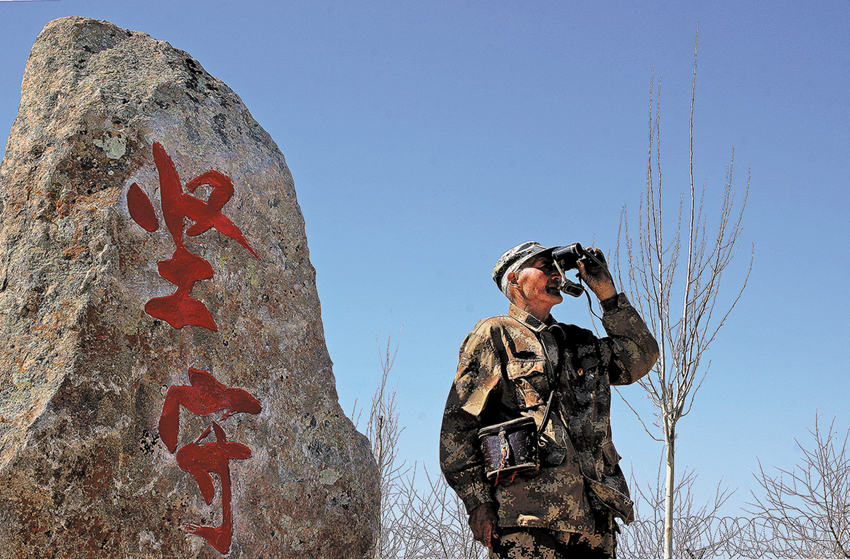Dutiful life in the middle of nowhere earns man award

Wei Deyou watches the border area in the Xinjiang Uygur autonomous region. (Photo/Xinhua)
Veteran Wei Deyou has watched western border for decades in remote frontier
In 1967, Liu Jinghao, a woman from Eastern China's Shandong province, traveled thousands of kilometers to fulfill an engagement in the Xinjiang Uygur autonomous region, in the country's far west. She was on her way to marry a 27-year-old veteran.
Wei Deyou, the groom-to-be, had served four years in the military until he headed west in 1964. He had grown up in the same village as Liu, and neighbors introduced them to each other.
As Liu arrived in Xinjiang, she felt a sense of regret.
Reluctantly, she was forced to take a donkey wagon to cross the desolate, roadless wilderness that lay between her and her fiance, who was living in Sarbulak, an area west of Urumqi, near the border of Kazakhstan, then part of the Soviet Union. She was shocked by what she saw when she arrived.
The wedding room Wei had prepared for his future wife was a shelter dug underground, and as Liu looked around, she saw that they were alone.
The nearest human to them was a fellow veteran stationed a few dozen kilometers away.
As summer got underway, sandstorms and gadfly infestations the following month proved too much. Liu packed up her stuff and left one afternoon.
It took Wei 40 minutes to catch up to his wife.
"Where are you going?" He shouted as he approached. "There are wolves around here."
Liu stopped. Eventually, Wei was able to persuade her to turn back and the couple went home together.
Although he had promised his wife they would leave after a few years, the couple remained in Sarbulak for the next 57 years, raising four children and helping Wei fulfill the promise he had made the first time he went to Xinjiang.
In 1964, answering the country's call, Wei joined the Xinjiang Production and Construction Corps, and as a veteran who wanted to keep serving, he promised he would go to wherever the corps pointed on a map.
A unique State-owned economic and paramilitary organization, the corps is mostly composed of former soldiers, and after it was deployed in the region in the 1950s, many members retired and began to participate in local economic development.
After arriving in Xinjiang, Wei became a herdsman and was also responsible for border patrols. Thirty more veterans were also dispatched to Sarbulak with him.
Every day, they traveled the 500,000-square-kilometer area with their herds, mostly sheep, searching for any suspicious movement along the border.
"You have to really keep an eye on the animals. Herdsmen from other county would cross the border in search of better grass, unaware this could easily trigger tension on both sides," Wei said.
The daily patrol usually ended before nightfall, but whether on or off duty, the patrolmen suffered countless mosquito bites in summer and had to dig themselves out of a meter or more of snow in winter.
In 1982, when they were dismissed from duty, the community of over 100 households began to dissolve. Most gradually left to rejoin the wider world.
Wei also had the chance to leave, but he decided to stay. The veteran said he had gotten used to life in Sarbulak, and besides, with the frontier guards he'd served alongside, some of whom had even helped him build a decent house for his family, he felt an attachment to the land.
The birth of their children comforted Liu, who finally began to settle in their lonely house on the frontier.
From then on, the family was only left with vast open spaces and their most valuable possession: a flock of about 100 sheep. For Wei, the promise he had made still counted and he continued to patrol the border voluntarily.
In the eyes of his children, he became a real nomad, one who resisted the call of urban society. They remember that their father rarely went into town.
"He was a stubborn man who did not want to leave Sarbulak for a minute," said Wei Peng, Wei's second daughter.
Wei and his wife retired in 2002, but again, they decided to stay. Later, their children bought an apartment in the nearest town in the hopes that their parents would enjoy a better life there. Still, Wei refused and returned to where he felt he belonged.
During 50 years on patrol, Wei traveled more than 200,000 km, and the border area he was responsible for remained safe without any incidents.
In 2017, his perseverance and tales of life on the frontier were the inspiration for a movie. Afterward, Wei received several commendations for long and dutiful service.
This year, on the 100th anniversary of the founding of the Communist Party of China, the CPC Central Committee chose to recognize the contributions of 29 outstanding Party members, with the new July 1 Medal. Wei was among those selected.
In over 50 years, he only saw his mother once. When his parents died, he was unable to return for either funeral as the road out of Sarbulak was buried in thick snow both times. This has been Wei's greatest regret.
Though he no longer herds sheep, he still walks 8 km to the border every day, to make sure that everything is alright.
"When there is faith in your heart, there is power in your feet," the 81-year-old veteran said.
Photos
Related Stories
Copyright © 2021 People's Daily Online. All Rights Reserved.










